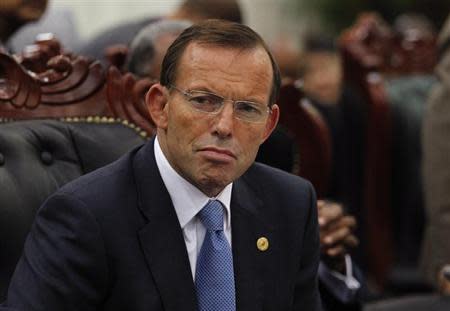Indonesia warns relations with Australia to worsen after spying leak
By Kanupriya Kapoor JAKARTA (Reuters) - Indonesia called back its envoy to Australia for consultations on Monday after media reported that Australia's spy agencies had tried to tap mobile phones of top officials, calling the eavesdropping an "unfriendly" act that would damage ties. The call for the envoy to come home marks a new low in increasingly tetchy relations between the neighbors since Australia's conservative prime minister, Tony Abbott, took office in September. Indonesia was upset over earlier reports of Australian spying and differences over the heavily politicized issue of asylum seekers trying to reach Australia via Indonesia. "We are calling our ambassador back from Canberra immediately for a consultation," Foreign Minister Marty Natalegawa told reporters. "I cannot say for how long, but I told him not to carry only cabin baggage." The Guardian newspaper and Australian Broadcasting Corp cited a secret document from 2009 leaked by U.S. National Security Agency (NSA) contractor Edward Snowden, saying President Susilo Bambang Yudhoyono, his wife and senior officials were targeted for electronic surveillance by Australia's Defense Signals Directorate (DSD). "It violates every single decent and legal instrument I can think of on a national level in both countries and on an international level. This is nothing less than an unfriendly act and it has a serious impact on bilateral relations," Natalegawa said. He said Indonesia would review its cooperation on the exchange of information with Australia. "This may entail the principle of reciprocity. So for instance, it implies there should be corresponding numbers of officials at the embassies here and in Australia who deal with intelligence," he said. "This does not mean we are expelling anyone, I'm not privy to the exact numbers right now but we will try to have corresponding number of officials." "Australia has systematically, one by one, violated the principles of democracy and privacy ... We've heard some clarification from Australia but we're not satisfied with their dismissive answers as if it is a matter of course in diplomatic relations to spy on other countries." NAMES AND NUMBERS Reports last month that Australia's embassy in Indonesia had been used as part of a U.S.-led surveillance network to spy on Indonesia, prompted a stern rebuke. Australian media reported that Australian embassies across Asia were part of the U.S.-led electronic surveillance operation, according to leaked Snowden documents. The latest leaked documents contained a slide presentation which showed a list of Indonesian leaders' mobile phone details. One showed how the DSD had attempted to listen in on a call from an unknown Thai number to the Indonesian president. Another showed what were purported to be call data records for Yudhoyono's mobile phone for 15 days in August 2009, recording the numbers called and the duration. "It is the established practice of successive Australian governments not to comment on intelligence matters," a spokesman for Australia's Department of Foreign Affairs said in an emailed statement responding to a request for comment. Earlier Snowden leaks have detailed vast intelligence collection by the U.S. National Security Agency (NSA) on allies, including German Chancellor Angela Merkel, prompting protests and a U.S. review of intelligence gathering. Indonesia is Australia's nearest Asian neighbor and an important strategic ally. Relations were already shaky after Abbott in September proposed turning back boats of asylum-seekers hoping to reach Australia after coming through Indonesia. (Correct spelling of surname in paragraph 2.) (Additional reporting by Lincoln Feast in Sydney; Writing by Jonathan Thatcher; Editing by Robert Birsel)



